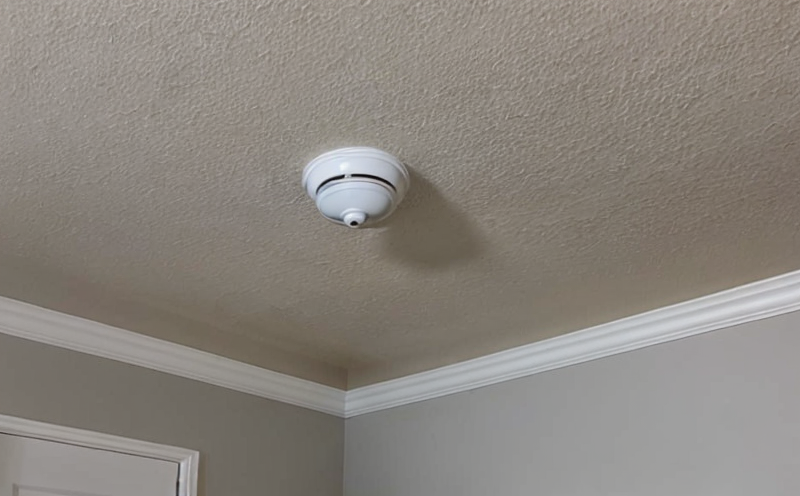Smoke detector installation inspection
The installation of smoke detectors is a critical component of fire safety infrastructure in residential, commercial, and industrial settings. Properly installed smoke detectors can significantly reduce the risk of injury or loss of life during fires by providing early warnings. This service focuses on ensuring that smoke detectors are not only correctly placed but also functional according to local building codes and international standards.
The role of a professional inspection is twofold: first, it ensures compliance with relevant regulations such as NFPA 72 (National Fire Protection Association) and EN 54-1 for Europe. Compliance is paramount because non-compliance can result in penalties or the need for costly retrofits. Second, it guarantees that the smoke detectors are installed correctly to maximize their effectiveness.
Smoke detector installation involves several key steps including site assessment, choosing the appropriate type of detector (ionization, photoelectric, or combined), selecting the right location within a building, and ensuring proper mounting and wiring. Each step is crucial for optimal performance:
- Site Assessment: Understanding the specific needs of the space to determine where detectors should be placed.
- Type Selection: Choosing between ionization (sensitive to fast-flaming fires), photoelectric (better at detecting smoldering fires), or combined models.
- Location: Ensuring that each detector is placed in an optimal spot, away from drafts and excessive humidity.
- Mechanical Installation: Properly mounting the device without compromising its functionality or accuracy.
The inspection process itself involves a thorough walkthrough of the premises to check for any issues. This includes testing each detector’s response time, sensitivity, and overall operational integrity. The inspector will ensure that all connections are secure, wiring is correct, and the detectors are not obstructed by furniture or other objects.
Once installed, regular maintenance and testing are essential to keep smoke detectors effective over their lifetimes. This service includes recommendations for ongoing checks, replacement of batteries, and calibration adjustments. By adhering to these practices, building owners can ensure that their fire safety measures remain robust against potential hazards.
Scope and Methodology
| Aspect | Description |
|---|---|
| Site Assessment | Evaluation of the building’s characteristics to identify optimal locations for smoke detectors. |
| Type Selection | Determination of the appropriate type of detector based on fire risk assessment and local codes. |
| Location | Identification of strategic positions within the structure, considering factors like airflow and humidity levels. |
| Mechanical Installation | Verification that detectors are properly mounted and wired without compromising their function. |
| Testing | Conducting functional tests to ensure each detector responds accurately and promptly. |
| Compliance Verification | Ensuring all installations comply with NFPA 72, EN 54-1, and other relevant local regulations. |
The inspection process is designed to be comprehensive yet efficient. By adhering strictly to the outlined scope and methodology, our team ensures that every installation meets not only regulatory requirements but also practical standards for maximum effectiveness.
Benefits
- Enhanced Safety: Reduced risk of fire-related incidents due to early detection capabilities.
- Regulatory Compliance: Ensures installations are in line with all applicable regulations, avoiding legal issues and fines.
- Potential Insurance Savings: Properly installed smoke detectors may lead to lower insurance premiums by demonstrating a commitment to safety measures.
- Peace of Mind: Knowing that fire protection systems are functioning correctly provides reassurance for property owners and occupants alike.
- Ease of Maintenance: Professional inspections help establish clear maintenance schedules, making the process easier and more effective.
- Increased Property Value: Well-installed safety features can enhance a property’s appeal to potential buyers or renters.
- Potential for Tax Incentives: Some jurisdictions offer incentives for properties with state-of-the-art fire protection systems, including properly installed smoke detectors.
These benefits underscore the importance of rigorous inspection and maintenance practices. Investing in this service can yield long-term dividends by promoting safety, compliance, and property value.
Why Choose This Test
Choosing our smoke detector installation inspection service offers several advantages over less thorough or DIY approaches:
- Expertise: Our team comprises experts familiar with the latest technologies and best practices in fire safety.
- Comprehensive Coverage: We provide a full range of services, from initial assessment to ongoing maintenance recommendations.
- Local Knowledge: Understanding regional regulations ensures that installations meet all necessary requirements.
- Peace of Mind: Knowing your smoke detectors are installed correctly and compliantly provides significant reassurance.
- Cost-Effectiveness: While professional installation may seem expensive upfront, it can save on potential fines and insurance costs over time.
- Longevity: Proper installations lead to longer-lasting devices with better performance over their lifetimes.
- Customization: We tailor our services to meet the specific needs of each client, ensuring that all unique factors are considered.
In summary, selecting this service ensures that your smoke detectors not only comply with regulations but also function optimally, thereby enhancing overall safety and peace of mind for all occupants of a building.





